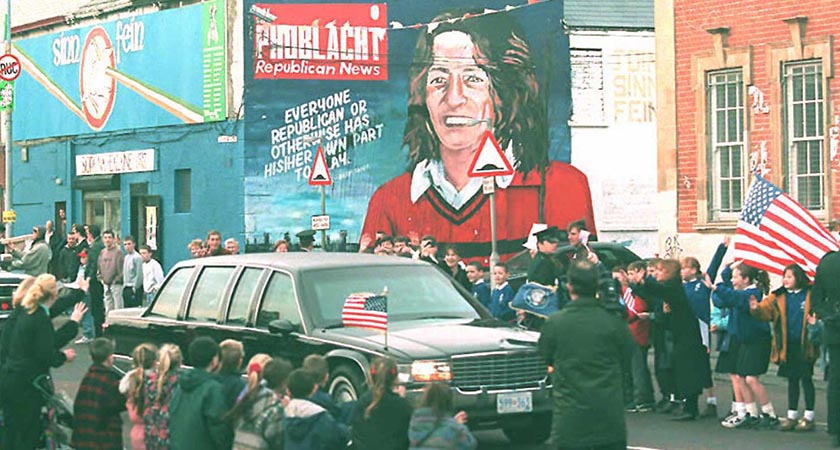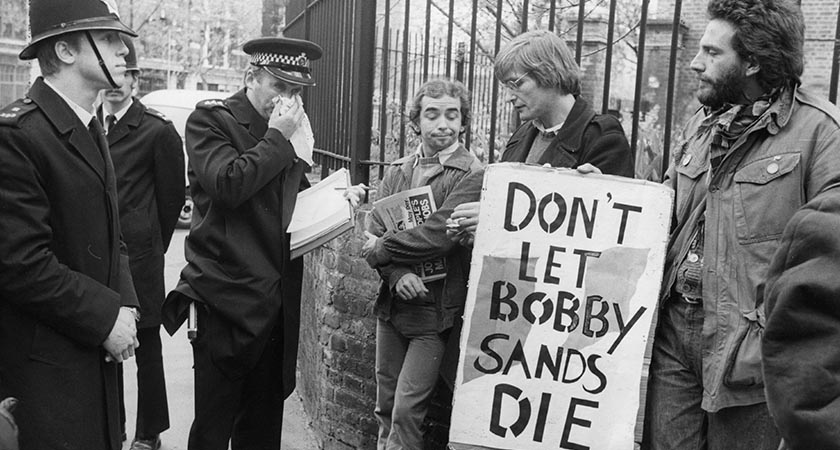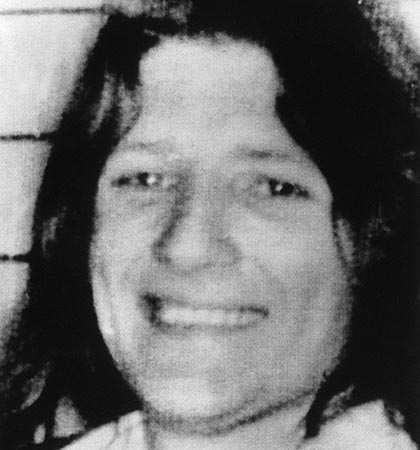1. Bobby Sands was the first hunger striker to die in the 1981 hunger strike
2. He died May 5, 1981, after 66 days without food
3. He was in a coma for 48 hours before being pronounced dead by medical staff at the Maze prison, Co. Antrim
4. Born Roibeard Gearóid Ó Seachnasaigh on March 9, 1954, in Rathcoole, Bobby Sands grew up in a predominantly loyalist district of north Belfast
5. From an early age, Sands was personally affected by the deep religious and political divides in the North; at the age of 10 his family were forced to move home owing to loyalist intimidation
6. Sands described that time later: "I was only a working-class boy from a nationalist ghetto, but it is repression that creates the revolutionary spirit of freedom. I shall not settle until I achieve liberation of my country, until Ireland becomes a sovereign, independent socialist republic.”
7. He was the eldest of four children – followed by sisters Marcella and Bernadette and brother John
8. At the age of 16, Sands became an apprentice coach builder, joining the National Union of Vehicle Builders; two years into his apprenticeship, but was forced out of his job
9. Aged 18, Sands joined the republican movement. Some of his cousins had been arrested and this prompted him to get involved
10. Four handguns were discovered in a house he was staying in and so, in October 1972, Sands was imprisoned for three years for possession of arms
11. During his imprisonment, Sands read widely and taught himself the Irish language, which he would later teach to fellow prisoners in the H-Blocks
12. Released in 1976, Bobby returned to his family in Twinbrook, and resumed his active role in the Provisional IRA
13. Six months later he was arrested again in connection with a bomb attack on the Balmoral Furniture Company at Dunmurry
14. Six men, including Sands, were taken to Castlereagh and were subjected to brutal interrogations for six days
15. Sands was a poet and wrote a 96 verse poem written in 1980, entitled The Crime of Castlereagh, about the experience
 US President Bill Clinton's car passes the Sinn Féin headquarters in Falls Road in Belfast with a mural of hunger striker Bobby Sands in the background. (Photo credit : GERRY PENNY/AFP/Getty Images)
US President Bill Clinton's car passes the Sinn Féin headquarters in Falls Road in Belfast with a mural of hunger striker Bobby Sands in the background. (Photo credit : GERRY PENNY/AFP/Getty Images)16. He was held on remand for 11 months until his trial in September 1977
17. Later, a judge sentenced Sands to 14 years in prison at Her Majesty's Prison's Maze, a facility used to house Republican prisoners from 1971 until 2000, located just outside of Belfast
18. He pushed hard for prison reforms, confronting authorities, and for his outspoken ways he was frequently given solitary confinement sentences
19. Sands also fought for IRA members to be treated as prisoners of war, not as criminals by the British Government
20. At 27 years old, on March 1, 1981, Sands led nine other Republican prisoners into the H Block section of the Maze prison
21. Unable to move authorities to give in to his requests, and unwilling himself to end his hunger strike, Sands's health began to deteriorate
22. During the first 17 days of the strike alone, Sands lost 16 pounds and his health began to suffer
23. Outside the prison walls, Sands gained hero status in some circles. During his imprisonment in Maze he was elected an MP for the constituency of Fermanagh and South Tyrone
24. Defiant till the end, Sands said: "They have nothing in their whole imperial arsenal that can break the spirit of one Irishman who doesn't want to be broken"
 A policeman talking to IRA sympathisers bearing banners on behalf of the hunger striker Bobby Sands at Clerkenwell Green in London. (Photo by Central Press/Getty Images)
A policeman talking to IRA sympathisers bearing banners on behalf of the hunger striker Bobby Sands at Clerkenwell Green in London. (Photo by Central Press/Getty Images)25. Bobby Sands, the first of 10 republican prisoners to die after the hunger strikes, died from malnutrition
26. He was married to Geraldine Noade, with whom he had one son, Gerard
27. It's estimated that over 100,000 people attended Bobby's funeral, however, his sister Bernadette Sands was unable to attend as she was on the run
28. Although dismissed by loyalists, Sands' death was a seminal moment in the history of the Troubles
29. Humphrey Atkins, Secretary of State for Northern Ireland said after his death: "I regret this needless and pointless death. Too many have died by violence in Northern Ireland. In this case it was self-inflicted."
30. The day after Bobby Sands died Margret Thatcher issued a terse statement saying: "Mr Sands was a convicted criminal. He chose to take his own life. It was a choice his organisation did not give to many of their victims."
31. The aftershock of the hunger strikes were enormous and eventually took the republican movement away from violence and towards ceasefire, decommissioning and power-sharing
32 .News of the death of Bobby Sands travelled far and wide. Nelson Mandela was said to have been "directly influenced by Bobby Sands."
33. As Danny Morrison wrote: Songs have been written about Bobby Sands and streets named after him. He was a poet, a revolutionary, and – in the words of singer Christy Moore – the "People's Own MP"
34. Turner Prize-winning artist Steve McQueen made the film Hunger in 2008 about Sands' time in prison, with actor Michael Fassbender in the starring role
35. One of Sand's most repeated quotes is: "Our revenge will be the laughter of our children."


